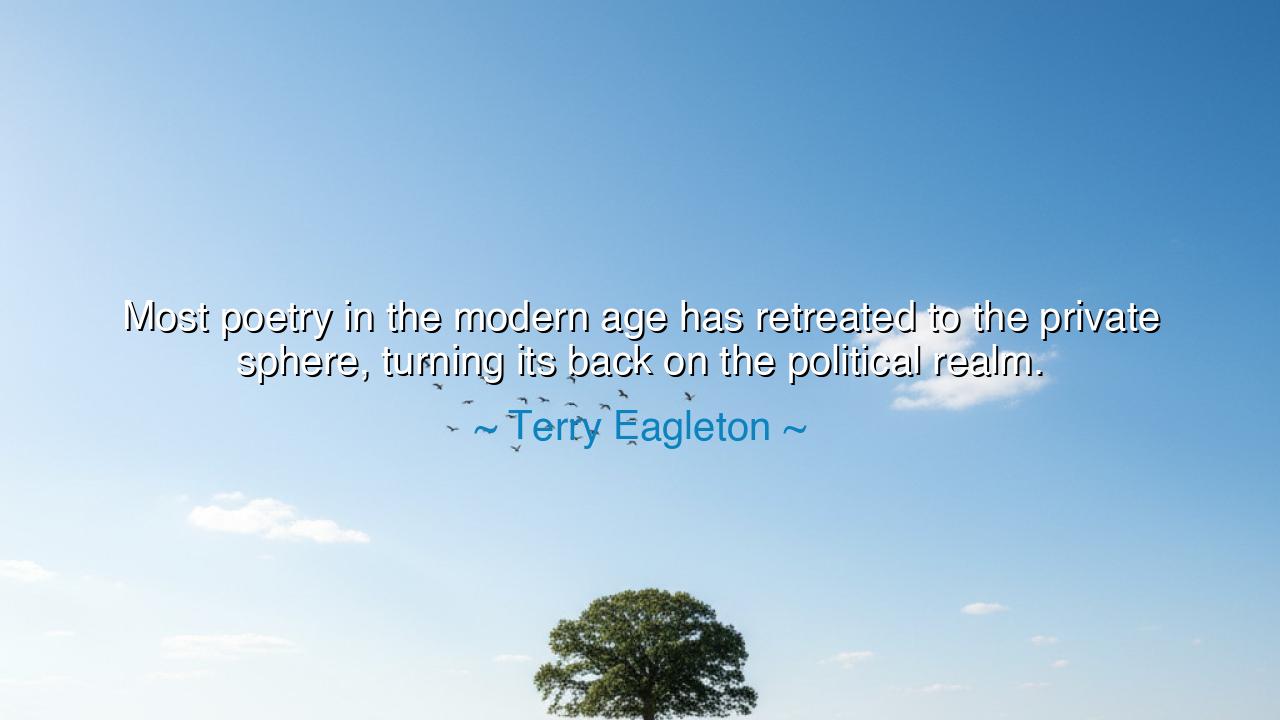
Most poetry in the modern age has retreated to the private
Most poetry in the modern age has retreated to the private sphere, turning its back on the political realm.






When Terry Eagleton declared, “Most poetry in the modern age has retreated to the private sphere, turning its back on the political realm,” he spoke as one mourning a great silence — the silence of the once-mighty voice of the poet. In these words lies not accusation alone, but lamentation. For there was a time when the poet was not merely a dreamer but a herald of nations, a builder of moral flame. Yet now, Eagleton observes, poetry has withdrawn into the chambers of solitude, speaking softly of the self while the world burns beyond its walls. The private sphere has become its fortress and its cage, a place of beauty but also of exile.
In the ancient world, the poet was the conscience of the people. Homer sang of valor, of gods and men, shaping a civilization’s sense of destiny. Sophocles and Euripides revealed the moral chaos of kings, holding a mirror before power. Even in later centuries, poets like Dante, Milton, and Blake wove visions that challenged empires and elevated the soul. Their words were thunder that roused nations. But in our modern time, as Eagleton grieves, poetry has grown timid. It whispers of heartbreak, identity, and the fleeting motions of the heart — worthy subjects, yet pale beside the burning questions of justice, freedom, and truth. It has abandoned the public square for the diary, the battlefield for the bedroom.
To turn one’s back on the political realm is, in Eagleton’s sense, to turn away from humanity’s great collective struggle — the cry of the oppressed, the greed of the powerful, the moral storms that shape the age. The poet once stood where the sword met the soul, naming injustice with the sharpness of verse. Think of Pablo Neruda, who dared to write against tyranny; of Langston Hughes, whose poems marched alongside the dreams of his people; of Anna Akhmatova, who bore witness to Stalin’s terror and turned her sorrow into the nation’s voice. These were poets who did not retreat. They stood where fear demanded silence and spoke anyway.
Why then has poetry retreated? Perhaps it is because the modern world deafens itself with noise. The song of profit, the hum of machines, the endless chatter of the digital age — all drown the poet’s cry. The political realm has become too vast, too corrupted, too tangled for the solitary voice to believe it can make a difference. So, poets turn inward, to the sanctuary of the self, where emotion still obeys no tyrant. Yet even there, they are haunted by the knowledge that silence, too, is a kind of complicity. For when poetry ceases to speak truth to power, it risks becoming mere decoration — a flower pressed between the pages of history, beautiful but dead.
But Eagleton’s words are also a summons. He calls the poet — and all who create — to remember that art was never meant to hide from the world. The poet’s duty is not comfort, but confrontation; not escape, but engagement. Poetry is not only the language of love but of liberation. It must once again dare to speak of hunger and war, of inequality and hope. To write for the heart is noble; to write for the soul of the people is divine. Every age needs its seers — those who refuse to retreat, who make beauty a weapon against corruption and despair.
Let us then recall the story of Shelley, who in his poem “The Mask of Anarchy” wrote in outrage after the Peterloo Massacre. His verses, though banned in his time, became a torch for later generations, kindling movements for democracy and justice. Shelley understood what Eagleton laments — that the poet’s silence is the tyrant’s ally. The pen, when used rightly, becomes a blade sharper than any sword. Through the courage of those who speak, nations remember their conscience.
So, what lesson shall we draw from Eagleton’s warning? It is this: Art must not flee the world, but face it. The poet, the artist, the thinker — all must reclaim their role as voices of the people, not echoes of themselves. Let your creativity become a banner, your words a form of resistance. Do not be content to feel; strive to awaken. For every poem that dares to challenge injustice, every song that kindles courage, every image that speaks truth — these are the new battlegrounds of the spirit.
Thus, remember this teaching: to create is to bear witness. Let your art not hide in the private chamber, but stride into the public square. Write not only of who you are, but of what must be changed. Let your words disturb the comfortable and comfort the disturbed. For in every age, when poetry finds its voice again, humanity remembers its soul.






AAdministratorAdministrator
Welcome, honored guests. Please leave a comment, we will respond soon